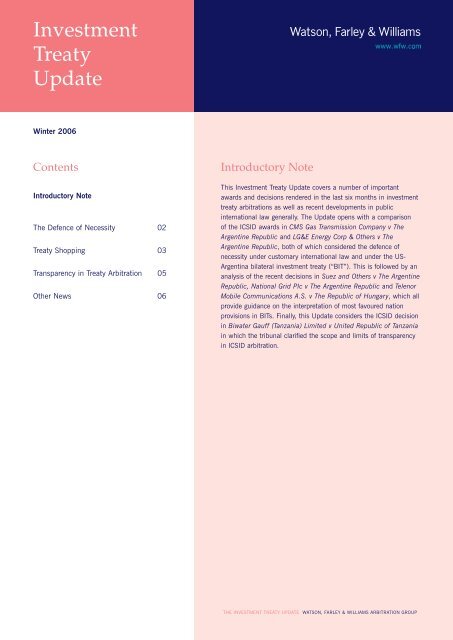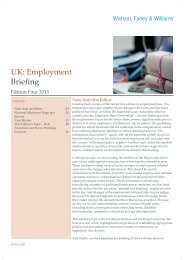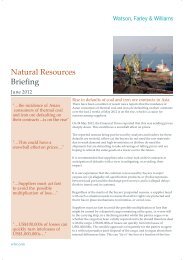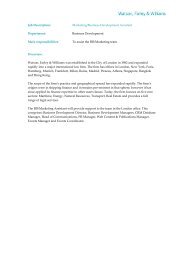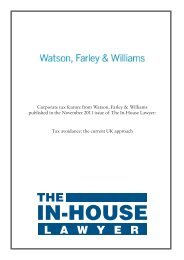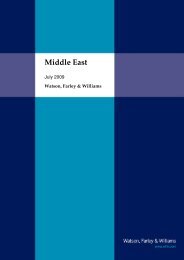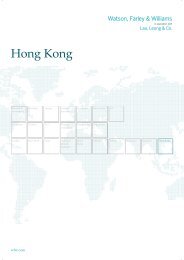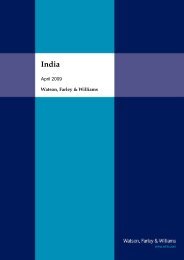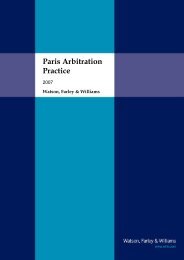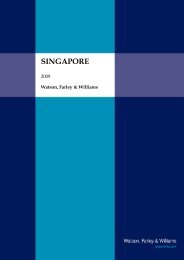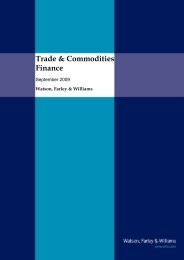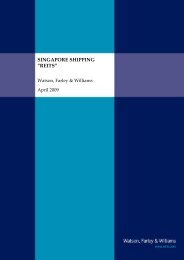Investment Treaty Update - Watson, Farley & Williams
Investment Treaty Update - Watson, Farley & Williams
Investment Treaty Update - Watson, Farley & Williams
You also want an ePaper? Increase the reach of your titles
YUMPU automatically turns print PDFs into web optimized ePapers that Google loves.
<strong>Investment</strong><strong>Treaty</strong><strong>Update</strong>Winter 2006ContentsIntroductory NoteThe Defence of Necessity 02<strong>Treaty</strong> Shopping 03Transparency in <strong>Treaty</strong> Arbitration 05Other News 06Introductory NoteThis <strong>Investment</strong> <strong>Treaty</strong> <strong>Update</strong> covers a number of importantawards and decisions rendered in the last six months in investmenttreaty arbitrations as well as recent developments in publicinternational law generally. The <strong>Update</strong> opens with a comparisonof the ICSID awards in CMS Gas Transmission Company v TheArgentine Republic and LG&E Energy Corp & Others v TheArgentine Republic, both of which considered the defence ofnecessity under customary international law and under the US-Argentina bilateral investment treaty (“BIT”). This is followed by ananalysis of the recent decisions in Suez and Others v The ArgentineRepublic, National Grid Plc v The Argentine Republic and TelenorMobile Communications A.S. v The Republic of Hungary, which allprovide guidance on the interpretation of most favoured nationprovisions in BITs. Finally, this <strong>Update</strong> considers the ICSID decisionin Biwater Gauff (Tanzania) Limited v United Republic of Tanzaniain which the tribunal clarified the scope and limits of transparencyin ICSID arbitration.THE INVESTMENT TREATY UPDATE WATSON, FARLEY & WILLIAMS ARBITRATION GROUP
“THE DOCTRINE OF “NECESSITY”, WHICH ALLOWS A STATETO TAKE NECESSARY MEASURES IN RESPONSE TO A CRISISWHICH MIGHT OTHERWISE VIOLATE ITS INTERNATIONALOBLIGATIONS, HAS LONG BEEN ACKNOWLEDGED UNDERCUSTOMARY INTERNATIONAL LAW.”The Defence of NecessityTwo recent ICSID decisions, CMS Gas Transmission Company vThe Argentine Republic (12 May 2005) and LG&E Energy Corp& Others v The Argentine Republic (3 October 2006) haveconsidered the defence of necessity under international law.However, although Argentina (the respondent in both cases)relied upon the same economic crisis as the basis for thedefence, the two tribunals came to different conclusions onwhether this was permissible.The doctrine of “necessity”, which allows a state to takenecessary measures in response to a crisis which mightotherwise violate its international obligations, has long beenacknowledged under customary international law. The principlesthat determine whether a state is entitled to invoke the defenceare set out in Article 25 of the International Law Commission’sdraft Articles on State Responsibility. This provides that thedefence may only be invoked when the measures taken are the“only means” to “safeguard an essential interest against agrave and imminent peril”. Article 25 also states that thedefence is not available if the state itself has contributed to thesituation of necessity (Art. 25(2)(b)).The situation of necessity relied upon by Argentina was thesevere economic crisis faced by the country from the end of1998 onwards. The Argentine Government took a number ofemergency measures in response to the crisis, such asabolishing peso-dollar parity, devaluing the peso, andterminating or suspending certain contractual rights. Many ofthese measures had adverse consequences for foreign investors,who had relied upon economic and regulatory stability whenmaking their investment in the country.CMS Gas TransmissionCMS Gas Transmission Company (“CMS”) was a US companywhich in 1995 had acquired a significant shareholding in theArgentine corporation, Transportadora de Gas del Norte(“TGN”), when what was previously a State-owned monopolyfor the production and distribution of gas had been broken upand privatised. CMS had invested almost US$175m in thepurchase of TGN shares, and commenced ICSID arbitrationproceedings claiming that the emergency measures taken bythe Argentine Government between 1999-2002 had devaluedthis investment by some 92%. CMS argued that Argentina’semergency measures had breached four obligations under theUS-Argentina BIT: (1) a prohibition on unlawful expropriation;(2) a promise to treat qualifying investments fairly andequitably; (3) a prohibition on arbitrary and discriminatorymeasures; and (4) an “umbrella” clause promising to observeobligations entered into with regard to investments.The ICSID tribunal rejected claims based upon expropriation andarbitrary/discriminatory treatment, but upheld claims that Argentinahad failed to accord the investment fair and equitable treatmentand failed to observe its obligations towards the investment. Thetribunal then went on to consider whether the ArgentineGovernment was excused from liability either by customaryinternational law or by Article XI of the US-Argentina BIT.Article XI of the BIT read as follows:“This <strong>Treaty</strong> shall not preclude the application by eitherParty of measures necessary for the maintenance of publicorder, the fulfilment of its obligations with respect to themaintenance or restoration of international peace orsecurity, or the protection of its own essential securityinterests.”The tribunal concluded that neither the relative effect of thecrisis, nor the degree of gravity of the peril faced by Argentina,were sufficient to allow a necessity defence under customaryinternational law. It also decided that the measures adopted byArgentina were not the only steps available to it, and that it hadcontributed to the crisis by its own actions. Accordingly itdismissed Argentina’s necessity arguments founded uponcustomary international law. The tribunal also rejected thedefence based upon Article XI of the BIT, principally because, inits opinion, the economic crisis was not of sufficient magnitudeto entitle Argentina to escape liability for violating theprotections afforded by an investment treaty.LG&E EnergyThe claimants in the LG&E Energy case were three affiliated UScompanies (collectively “LG&E”). LG&E had acquired ashareholding in three Argentine gas distribution companiesduring the drive towards privatisation in the early 1990s. As aresult of the Argentine Government’s emergency economicmeasures LG&E commenced an ICSID arbitration seekingcompensation of between US$248-268m, claiming thatArgentina had breached the same four provisions of the US-Argentina BIT relied upon by CMS. As in the CMS case, thetribunal found that Argentina had violated the fair and equitabletreatment provision and the umbrella clause, but not theclauses prohibiting unlawful expropriation orarbitrary/discriminatory treatment. Argentina again argued thatit was entitled to exemption from liability for treaty violations onthe grounds of necessity under both customary international lawand under Article XI of the BIT.THE INVESTMENT TREATY UPDATE WATSON, FARLEY & WILLIAMS ARBITRATION GROUP 02
“...THE ISSUE OF WHETHER AN INVESTOR CAN USE ANMFN CLAUSE TO INVOKE MORE FAVOURABLE DISPUTESETTLEMENT MECHANISMS IS MORE CONTROVERSIAL,AND REMAINS ONE OF THE MAIN AREAS OF DEBATE ININVESTMENT TREATY LAW.”The tribunal disagreed with the CMS tribunal by concludingthat during the period 1 December 2001 until 26 April 2003Argentina was in a period of crisis necessitating emergencymeasures for the maintenance of public order and theprotection of essential security interests. The tribunal acceptedthat by December 2001 the situation in the country requiredimmediate and decisive action to restore civil order and stopthe continuing economic decline, the severity of which wascomparable to an event such as a military invasion.Consequently, Argentina was excused by Article XI of the BITfrom liability to pay compensation for breaches of the treatyoccurring between 1 December 2001 and 26 April 2003.The tribunal also held that the seriousness of the threatposed by the economic crisis was sufficient to give rise to astate of necessity satisfying all the requirements of Article 25of the ILC’s Articles. Although Article 25 of the Articles onState Responsibility did not on its own establish Argentina’sdefence, it supported the tribunal’s findings with regard toArticle XI of the BIT.CommentThe defence of necessity under customary international law hasrarely been successfully invoked, and tribunals and courts haveconsistently emphasised that a state must satisfy stringentcriteria (as per Article 25 of the ILC’s Articles) before excusingits conduct on these grounds. The decision in LG&E is thereforeunusual, and it remains to be seen whether other tribunalsdealing with claims against Argentina (or against other hoststates which have experienced economic instability) will adoptsimilar findings. Allowing necessity to be invoked in times ofeconomic crisis could have significant implications forinternational investors, since it is in such periods that hoststates may be most inclined to take extreme measures anddisregard the interests of foreign investors. If the defence ofnecessity is successfully invoked in future investment treatydisputes, it could seriously detract from the level of protectionafforded by a BIT, as well as discouraging inward investment instates with a history of economic turbulence.<strong>Treaty</strong> ShoppingThe last six months have seen a series of decisions onjurisdiction concerning the interpretation of most favourednation clauses in BITs. The “most favoured nation” or “MFN”clause is a standard provision found in most investmenttreaties, whereby the signatories promise that an investor fromthe other state, or its investment, will be treated by the hoststate “no less favourably” than an investor from a third country.Such an apparently innocuous provision can have a profoundeffect upon an investor’s rights, since it is capable of allowingthe wholesale importation into treaties of more favourablesubstantive rights granted by the host state to investors fromelsewhere. However, the issue of whether an investor can usean MFN clause to invoke more favourable dispute settlementmechanisms is more controversial, and remains one of the mainareas of debate in investment treaty law.The Maffezini and Plama decisionsThe issue was famously considered by a tribunal in Maffezini vSpain, an arbitration concerning a claim under the Argentina-Spain BIT. The Argentine investor invoked an MFN clause in theArgentina-Spain BIT to override the requirement that an investorfirst had to submit the dispute to the host state’s competentcourts and defer commencing an arbitration under the treatyuntil either (i) the competent court had ruled on the dispute; or(ii) eighteen months had passed with no decision. The tribunalheld that the MFN clause was such that the investor couldbenefit from the more favourable dispute resolution mechanismcontained in the Spain-Chile BIT, which imposed norequirement to resort to local courts before commencingarbitration.Since the Maffezini decision, tribunals have been inconsistentin their approach to similar arguments. Three tribunals havefollowed Maffezini (Siemens v The Argentine Republic(3 August 2004), Camuzzi v The Argentine Republic (10 June2005) and Gas Natural v The Argentine Republic (17 June2005)); one has questioned the decision but ultimatelydistinguished the applicable clause on the basis of its specificwording (Salini Costrutti v Jordan (15 November 2004)) andanother has rejected it entirely (Plama Consortium v Bulgaria(8 February 2005)).The Plama arbitration concerned a claim against the Bulgariangovernment under the Cyprus-Bulgaria BIT. The investor soughtto overcome Bulgaria’s limited consent (contained in the BIT) toad hoc UNCITRAL arbitration of disputes “with regard to theamount of compensation” due to an investor only after themerits had been adjudicated “through the regular administrativeand legal procedure(s) of (Bulgaria)”. It did so by relying on theBIT’s MFN clause to import a wider consent to ICSID arbitrationof general investment disputes contained in other BulgarianBITs. In its decision, the Plama tribunal rejected the reasoningadopted in Maffezini, commenting that “the expansiveinterpretation of (the MFN clause) made in the Maffezini case… went beyond what State Parties to BITs generally intendedto achieve by an MFN provision in a bilateral or multilateralinvestment treaty”. The Plama tribunal held that an MFNclause “does not incorporate by reference dispute settlementTHE INVESTMENT TREATY UPDATE WATSON, FARLEY & WILLIAMS ARBITRATION GROUP 03
“...THE RIGHT TO HAVE RECOURSE TO INTERNATIONALARBITRATION WAS VERY MUCH RELATED TO INVESTORS’“MANAGEMENT, MAINTENANCE, USE, ENJOYMENT ORDISPOSAL OF THEIR INVESTMENTS” AND IN PARTICULARTHE “MAINTENANCE” OF INVESTMENTS.”provisions in whole or in part set forth in another treaty,unless the MFN provision in the basic treaty leaves no doubtthat the Contracting Parties intended to incorporate them”.More Recent DecisionsMFN clauses have been the focus of three recent decisions inthe last six months: (1) National Grid Plc v The ArgentineRepublic (20 June 2006), (2) Suez, Sociedad General deAguas de Barcelona, S.A. and Vivendi Universal S.A. v TheArgentine Republic and Anglian Water Group Ltd. v TheArgentine Republic (3 August 2006) and (3) Telenor MobileCommunications A.S. v The Republic of Hungary (13September 2006).In the Suez case, the arbitration concerned claims againstArgentina relating to the provision of water services. SociedadGeneral de Aguas de Barcelona S.A. (“AGBAR”) and AnglianWater Group Ltd. (“AWG”) sought to invoke the MFN clauses ofthe Spain-Argentina and UK-Argentina BITs respectively in orderto overcome requirements in those BITs to pursue claims foreighteen months in domestic courts prior to pursuinginternational arbitration. The investors argued that they shouldbe treated the same as their French counterparts, Suez andVivendi, who were entitled under the France-Argentina BIT topursue international arbitration after a six month waiting period.In the case of the Spain-Argentina BIT, the MFN clauseexpressly applied to “all matters” covered by the treaty. Thetribunal held that dispute settlement was clearly a “matter”covered by the BIT and held that the most favourable treatmentafforded by the BIT applied to the right to dispute settlement.Accordingly, AGBAR was able to obtain the more favourabletreatment found in the France-Argentina BIT.The MFN clause in the UK-Argentina BIT was not expresslystated as applying to “all matters”. However, the tribunalinterpreted “treatment” as meaning “the rights and privilegesgranted and the obligations and burdens imposed by aContracting State on investments made by investors coveredby the treaty”. The tribunal held that the right to have recourseto international arbitration was very much related to investors’“management, maintenance, use, enjoyment or disposal oftheir investments” and in particular the “maintenance” ofinvestments.The tribunal in National Grid Plc v The Argentine Republic alsohad to consider the MFN clause in the UK-Argentina BIT. Inreaching its decision, the tribunal endorsed the reasoning in theMaffezini case. As in Maffezini, the National Grid tribunalsought to stress that there were limits to how far theinterpretation of MFN clauses extended. However, the NationalGrid tribunal was of the opinion that the purpose of an MFNclause was “to ensure that foreign investors are treated on abasis of parity with other foreign investors and with nationalinvestors when they invest abroad”.The National Grid tribunal did not expressly reject the Plamadecision, but did seek to distinguish it. In this instance thetribunal did so on the basis that Plama was an example of anattempt to extend the interpretation of an MFN clause beyondappropriate limits, and that the Plama decision did not “justifydepriving the MFN clause of its legitimate meaning or purposein a particular case”. Neither tribunal expressed an opinion asto whether an MFN clause of the kind considered by the Plamatribunal could have the effect of replacing a BIT’s disputeresolution mechanism.The Telenor DecisionThe very recent Telenor case concerned a claim against theHungarian government under the Hungary-Norway BIT. TheNorwegian investor sought to overcome Hungary’s limitedconsent (contained in the BIT) to ICSID arbitration for disputes“concerning the amount or payment of compensation … orconcerning any other matter consequential upon an act ofexpropriation” in order to pursue a claim before ICSID forbreach of the BIT’s fair and equitable treatment provision. In itsdecision, after having considered the Maffezini award andsubsequent decisions which had followed it, the Telenortribunal endorsed the Plama decision and its reasoning. Further,the Telenor tribunal used the same grounds relied upon by theSuez tribunal to distinguish the Plama decision, to distinguishits own case from the Suez decision.CommentIt is perhaps an overstatement to suggest that the recentdecisions represent a consensus of legal opinion on theinterpretation and application of MFN clauses, such that anMFN clause in a basic treaty can be invoked in order toovercome prescribed waiting periods by importing morefavourable dispute settlement provisions from third party BITs,but not to create jurisdiction not envisaged by the contractingparties to the BIT. Despite the recent decisions, the reasoningadopted by the tribunals in Maffezini and Plama remainsinconsistent and hard to reconcile. It is therefore likely that thisissue will continue to be an area of controversy in investmenttreaty jurisprudence.THE INVESTMENT TREATY UPDATE WATSON, FARLEY & WILLIAMS ARBITRATION GROUP 04
“THE DESIRE FOR TRANSPARENCY OFTEN CLASHES WITHTHE PRESUMPTION OF CONFIDENTIALITY USUALLYATTACHING TO THE ARBITRAL PROCESS, WHICH MANYPRACTITIONERS ASSUME SHOULD APPLY EQUALLY TOTREATY ARBITRATION.”Transparency in <strong>Treaty</strong> ArbitrationConfidentiality is one of the main features and advantages ofinternational commercial arbitration, and flows from the natureof arbitration as a private process between private partiespursuant to an express agreement to resolve disputes that way.In investor-state treaty arbitrations, however, the arbitration isprimarily founded upon a treaty and/or national legislativeprovisions rather than upon a negotiated dispute resolutionagreement between the parties. Furthermore, the general publicinterest in investor-state disputes, as well as states’ generalduty of accountability, influence the character of the arbitration.Accordingly, the development of investor-state arbitrations overthe past decade has given rise to calls for greater transparencyin these proceedings. The desire for transparency often clasheswith the presumption of confidentiality usually attaching to thearbitral process, which many practitioners assume should applyequally to treaty arbitration. It may also conflict with theintegrity of the arbitral process as a means of achieving a fairresolution of the dispute.In Biwater Gauff (Tanzania) Limited v United Republic ofTanzania, an eminent ICSID tribunal attempted to balance theconflicting requirements of confidentiality, transparency andprocedural integrity. The tribunal was called upon to clarifythese issues in circumstances where the parties wereconducting media campaigns against each other, in a disputewhich attracted, and continues to attract, general media, NGOand public interest.In 2005, a dispute arose between Biwater Gauff (Tanzania) Ltd(“BGT”), a joint venture company, and the United Republic ofTanzania (“Tanzania”). BGT alleged that in 2005 Tanzaniaexpropriated its investment when the government repudiated acontract with BGT’s Tanzanian subsidiary (City Water) for theprovision of water and sewerage services, deported City Water’ssenior management, seized the company’s assets, occupied itsoffices and took over its business. BGT commenced ICSIDarbitration proceedings against Tanzania in August 2005. InMarch 2006 the tribunal held its first session and in May 2006it issued procedural order No.2 for the production ofdocuments.Shortly afterwards, Tanzania unilaterally “leaked” the minutes ofthe first session and a copy of the procedural order No.2, bypublishing them on the internet. Tanzania’s Counsel admittedbeing the origin of the “leak” and subsequently declined to givean undertaking not to disclose BGT’s recently filed pleadings,the exhibits attached thereto or any of the nine files of materialproduced by BGT in compliance with procedural order No.2.BGT applied for interim relief seeking to protect theconfidentiality of these documents.The issue raised by BGT’s application was delicate. On theone hand, BGT argued that the disclosure of such documentsbreached Tanzania’s obligations to observe the proceduralintegrity of the arbitration and not to aggravate the dispute.On the other hand, Tanzania argued that it had consistentlyadvocated the importance of transparency in this dispute,and that neither the ICSID convention nor the ICSIDArbitration Rules authorised the restrictions on transparencysought by BGT.The tribunal found that the media campaigns conducted by theparties and the general public and media interest in the disputewere sufficient threats to the procedural integrity of thearbitration, and gave rise to a concrete risk of aggravation andexacerbation of the dispute, requiring restrictions on thetransparency of the proceedings. However, in view of the publicnature of the dispute, the tribunal decided that any restrictionson transparency had to be carefully and narrowly defined. Thetribunal ordered that, in the absence of agreement, the partiesshould refrain from disclosing to third parties numerouscategories of documents produced in the arbitration (includingpleadings, disclosure and records of hearings). However, thetribunal allowed the parties to apply for these restrictions to belifted or varied on a case by case basis. It further ordered thatits decisions, orders or directions other than awards were not tobe disclosed to third parties, but allowed the parties to seek itsprior permission to do so. Finally, the tribunal reminded theparties that they were entitled to engage in general discussionabout the case in public, provided that any such publicdiscussion be restricted to what was necessary, and not beused as an instrument to antagonise the other party, exacerbatetheir differences, unduly pressurise a party, or render theresolution of the dispute potentially more difficult.Confidentiality v TransparencyThe tribunal noted that in the absence of any agreementbetween the parties on confidentiality or transparency, and inthe absence of relevant provisions on either issue in anapplicable BIT, there was no provision imposing a general dutyof confidentiality in ICSID arbitration, whether under the ICSIDConvention, the ICSID Administrative and Financial Regulations,the ICSID Arbitration Rules, the UNCITRAL Arbitration Rules orotherwise. Whilst these instruments ensure the privacy ofhearings, and provide for the publication of awards subject tothe parties’ consent, none expressly provides for theconfidentiality of pleadings, documents or other informationsubmitted by the parties during the arbitration. The tribunalTHE INVESTMENT TREATY UPDATE WATSON, FARLEY & WILLIAMS ARBITRATION GROUP 05
observed that equally, there was no provision imposing ageneral rule of transparency in any of those sources.Procedural Integrity and Non-exacerbationIt is now settled both in treaty arbitration and in internationalcommercial arbitration generally that arbitral tribunals areentitled to direct the parties not to take any steps that mightharm or prejudice the integrity of the proceedings orexacerbate the dispute. This is reflected, for instance, in Article17 of the recently revised UNCITRAL Model Law. Proceduralintegrity and non-aggravation of disputes embrace a widerange of concepts and aims. These include preserving thetribunal’s mandate to determine the dispute, ensuring a levelplaying field, minimising the scope for external pressure on anyparty, and avoiding trial by media. The tribunal stressed,however, that the procedural integrity and non-aggravation ofdispute interests may only allow for temporary restrictions ontransparency, most of which will cease to apply once thearbitration comes to an end.Other News…■■■The Washington Convention entered into force in Pakistan on8 November following the Government of Pakistan’spromulgation of the Arbitration International <strong>Investment</strong>Disputes Ordinance 2006, which granted jurisdiction to theHigh Courts in Pakistan for anyone wanting to enforce anaward. While Pakistan signed the convention in 1965 andratified it in 1966, it was not previously implemented intoPakistan’s domestic law and as a result had no effect. Thenews fulfils Pakistan’s international obligations under theWashington Convention.Pakistan has also been unanimously invited by the EnergyCharter Conference to become the 53rd member of theEnergy Charter, opening the way for Pakistan to accede tothe 1994 Energy Charter <strong>Treaty</strong>. Pakistan will legally becomea party to the Energy Charter <strong>Treaty</strong> and member of theEnergy Charter Conference 90 days after the receipt ofnotification that Pakistan has completed its own proceduresfor accession and ratification.MIGA (The Multilateral <strong>Investment</strong> Guarantee Agency) haslaunched its new political risk insurance website. The newwebsite offers users a searchable database of web-baseddocuments on political risk environments; legal issuesrelated to arbitration, mediation and other investmentdispute resolution and prevention mechanisms; researchfindings and analyses of political risk issues and theirrelationship to foreign direct investment; as well asspecialised tools for practitioners.Click here for MIGA's new websiteIf you wish to discuss any of the contents of this <strong>Update</strong>,please do not hesitate to speak to your usual contact at<strong>Watson</strong>, <strong>Farley</strong> & <strong>Williams</strong> or one of the people listed below:David Kavanaghdkavanagh@wfw.com+44 (0) 207 814 8000Olga Baglayobaglay@wfw.com+44 (0) 207 814 800Raja Boserajabose@wfw.com+(65) 6532 5335Peter Flintpflint@wfw.com+44(0) 207 814 8000David Fosterdfoster@wfw.com+44 (0) 207 814 8000Andrew Hutcheonahutcheon@wfw.com+44 (0) 207 814 8000Andrew Savageasavage@wfw.com+44 (0) 207 814 8000<strong>Watson</strong>, <strong>Farley</strong> & <strong>Williams</strong>15 Appold StreetLondon EC2A 2HBTel: +44 (0) 207 814 8000Fax: +44 (0) 207 814 8141/2www.wfw.comWATSON, FARLEY & WILLIAMS LONDON ATHENS PARIS NEW YORK SINGAPORE BANGKOK ROME HAMBURGAll references to ‘<strong>Watson</strong>, <strong>Farley</strong> & <strong>Williams</strong>’ and ‘the firm’ in this brochure mean <strong>Watson</strong>, <strong>Farley</strong> & <strong>Williams</strong> LLP and/or its affiliated undertakings. Any reference to a 'partner' means a member of <strong>Watson</strong>, <strong>Farley</strong> &<strong>Williams</strong> LLP, or a member or partner in an affiliated undertaking, or an employee or consultant with equivalent standing and qualification.This brochure is produced by <strong>Watson</strong>, <strong>Farley</strong> & <strong>Williams</strong>. It provides a summary of the legal issues, but is not intended to give specific legal advice. The situations described may not apply to your circumstances. Ifyou require advice or have questions or comments on its subject, please speak to your usual contact at <strong>Watson</strong>, <strong>Farley</strong> & <strong>Williams</strong>.


